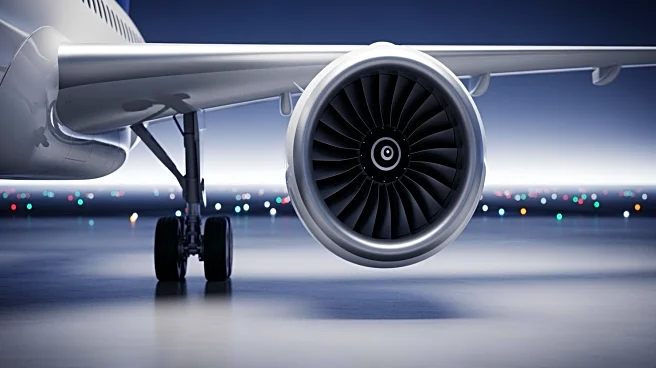What's Happening?
Swiss International Air Lines is facing persistent reliability issues with the Pratt & Whitney PW1500G engines that power its Airbus A220 fleet. According to Swiss CEO Jens Fehlinger, these problems are
expected to continue throughout the decade, significantly affecting the airline's operations. Swiss, a subsidiary of the Lufthansa Group, was the launch customer for the A220-100, and currently operates nine of these aircraft alongside 21 larger A220-300 models. The fleet has an average age of 7.89 years. Fehlinger noted that more than 10 aircraft in Swiss's short-haul fleet are grounded due to engine issues, with expectations that around 10 A220s will remain unproductive next year. This situation has led to a 25% reduction in flight hours from September 2019 to September 2025. Swiss also operates 17 A320neo-family aircraft, which are experiencing fewer issues, although the number of grounded A320neos is expected to rise next year.
Why It's Important?
The ongoing engine reliability issues with the A220 fleet have significant operational and financial implications for Swiss International Air Lines. Grounded aircraft result in reduced capacity and potential revenue losses, impacting the airline's ability to maintain its service levels and competitive position in the market. The situation also highlights broader concerns within the aviation industry regarding the reliability of new-generation engines, which could affect other airlines using similar technology. As Swiss considers expanding its fleet with larger narrowbody aircraft like the A320 family, the reliability of the A220 remains a critical factor in its strategic planning. The airline's experience may influence other carriers' decisions regarding fleet composition and engine selection.
What's Next?
Swiss is working on various mitigation measures to address the operational impact of the engine issues, aiming to maintain productivity despite the challenges. The airline is considering how to grow its fleet with more reliable aircraft, potentially focusing on the A320 family. As the situation develops, Swiss will likely continue to engage with Pratt & Whitney to resolve the engine problems and explore alternative solutions to minimize disruptions. The broader aviation industry will be watching closely, as the resolution of these issues could set precedents for handling similar challenges with new-generation aircraft engines.
Beyond the Headlines
The reliability issues with the A220 engines raise questions about the balance between technological advancement and operational dependability in the aviation industry. As airlines increasingly adopt new-generation aircraft for their efficiency and environmental benefits, ensuring consistent performance becomes crucial. The situation also underscores the importance of robust maintenance and support systems to address technical challenges promptly. Long-term, the industry may need to reassess the pace of innovation and the readiness of new technologies before widespread adoption.










